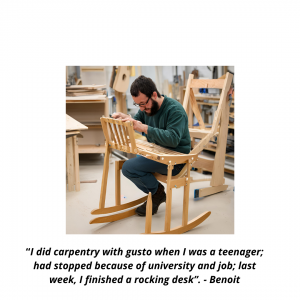
I sent the above photo to my friends in Australia and Singapore on 09/01/25 with this message: “It’s snowing in Luxembourg. It took me more than an hour to get home last night (distance – 28 km)”.
My bezzie texted back instantly, “Oh; that’s beautiful! I’d swap the extreme heat and severe summer thunderstorms for the snow at this time”.
A second later, this comment came from Aussie friends living in Singapore: “Our children were affected by the weather on their journeys back to the UK as they had cancellations in Singapore and delays in Frankfurt. On the other hand, we arrived in Melbourne on Saturday to 36 degrees”. Wow, how warm and sunny Down Under; so, I responded, “Wish I were there”.
There you are! “It’s always greener on the other side”, isn’t it?
“It’s greener on the other side” suggests that what we don’t have or haven’t experienced is more desirable than what is within our reach. I’ve lived in these two different climatic conditions and know what suits me better. I love the outdoors and picnicking with family and friends. Layers of clothing, bonnets and gloves make me uncomfortable. Hence, “It’s always greener on the other side” is inapplicable to my situation.
I’m not a great believer of “the other side is greener” because we are often blinded by the allure of the unknown and the belief that something better exists than we’re currently experiencing. The word “greener” is a comparative form, and we – humans – have the tendency to always compare things, places, events, and people. This comparison is frequently due to envy or dissatisfaction with one’s own situation, or it is due to our longing for what we perceive others have or enjoy.
Likewise, while it may feel like the grass is greener elsewhere, in reality, this belief can be an illusion. Any situation and relationship come with challenges that require work, compromise, and emotional investment. The idea that there’s something better waiting on the other side of the fence with no hurdle to jump can lead to dissatisfaction and a constant pursuit of the unattainable.
For example, employees may think that a new job, a different employer or manager, or a different industry will provide more fulfilment. However, no career is without its frustrations; contentment always comes from within and from dealing with those around us rather than constantly looking outward for an easier (so called “better”) option.
The reality behind the “greener” myth is that the only way to find real happiness is to appreciate what we already have and to make the most of the present. Constantly yearning for something else prevents us from seeing the wonderfulness and opportunities in our lives.
Coming back to my remark about the two geographical locations and their weather conditions, I’m grateful to have lived and worked in these two continents. There are imperfections and difficulties in these two countries; as well, someone’s nightmare can be another’s paradise. Personal happiness is highly subjective and depends on individual goals, values, and circumstances. What is “greener” for one person may not be for another and, often, we fail to acknowledge how much effort it takes to achieve these perceived “greener” outcomes.
The phrase “It’s always greener on the other side” should remind us of the danger of comparison and the unrealistic expectations we set for ourselves. While it’s natural to wonder if something else might be better, it’s important to remember that what we have is often more valuable than we realise.
For those who believe in Valentine’s Day, I wish you a fantastic celebration.


